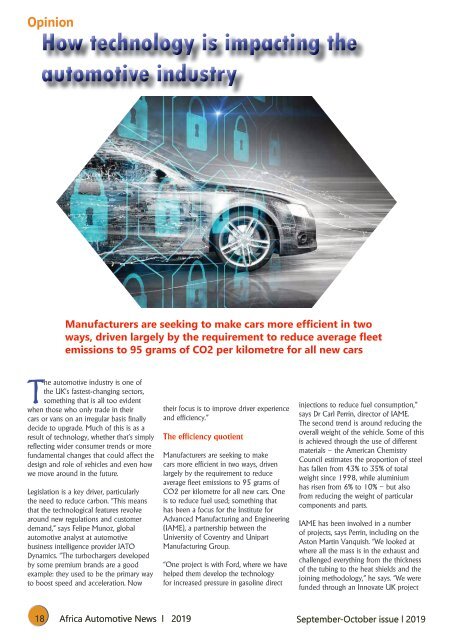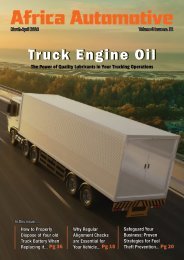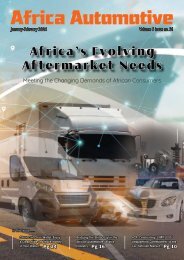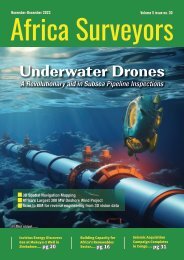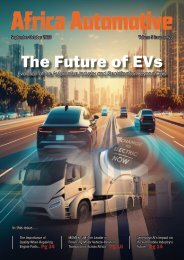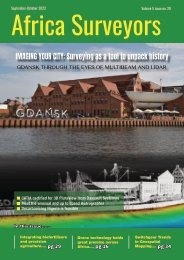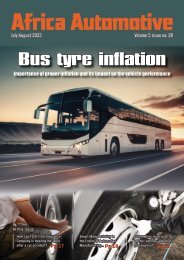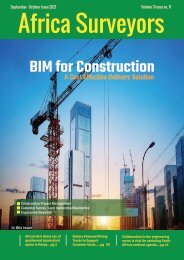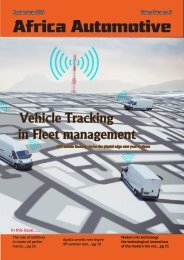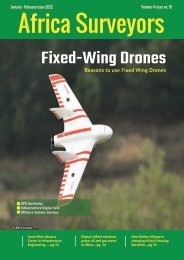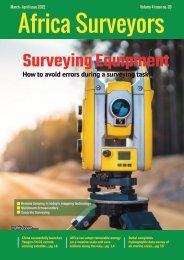Africa Automotive News September-October digital issue 2019
Africa Automotive prides itself to be the ONLY Africa’s leading and MOST authoritative magazine for the automotive industry in Africa with printed copies for the automotive industry decision makers in both government, NGO’s and private sector. The Bi-monthly magazine offers cost effective advertising services that get results and improves growth in the auto B2C and B2B sector, keeping an eye on latest technologies in Africa and across the world, the magazine predominately covers the developments in the Africa auto industry.
Africa Automotive prides itself to be the ONLY Africa’s leading and MOST authoritative magazine for the automotive industry in Africa with printed copies for the automotive industry decision makers in both government, NGO’s and private sector. The Bi-monthly magazine offers cost effective advertising services that get results and improves growth in the auto B2C and B2B sector, keeping an eye on latest technologies in Africa and across the world, the magazine predominately covers the developments in the Africa auto industry.
You also want an ePaper? Increase the reach of your titles
YUMPU automatically turns print PDFs into web optimized ePapers that Google loves.
Opinion<br />
How technology is impacting the<br />
automotive industry<br />
Manufacturers are seeking to make cars more efficient in two<br />
ways, driven largely by the requirement to reduce average fleet<br />
emissions to 95 grams of CO2 per kilometre for all new cars<br />
The automotive industry is one of<br />
the UK’s fastest-changing sectors,<br />
something that is all too evident<br />
when those who only trade in their<br />
cars or vans on an irregular basis finally<br />
decide to upgrade. Much of this is as a<br />
result of technology, whether that’s simply<br />
reflecting wider consumer trends or more<br />
fundamental changes that could affect the<br />
design and role of vehicles and even how<br />
we move around in the future.<br />
Legislation is a key driver, particularly<br />
the need to reduce carbon. “This means<br />
that the technological features revolve<br />
around new regulations and customer<br />
demand,” says Felipe Munoz, global<br />
automotive analyst at automotive<br />
business intelligence provider JATO<br />
Dynamics. “The turbochargers developed<br />
by some premium brands are a good<br />
example: they used to be the primary way<br />
to boost speed and acceleration. Now<br />
their focus is to improve driver experience<br />
and efficiency.”<br />
The efficiency quotient<br />
Manufacturers are seeking to make<br />
cars more efficient in two ways, driven<br />
largely by the requirement to reduce<br />
average fleet emissions to 95 grams of<br />
CO2 per kilometre for all new cars. One<br />
is to reduce fuel used; something that<br />
has been a focus for the Institute for<br />
Advanced Manufacturing and Engineering<br />
(IAME), a partnership between the<br />
University of Coventry and Unipart<br />
Manufacturing Group.<br />
“One project is with Ford, where we have<br />
helped them develop the technology<br />
for increased pressure in gasoline direct<br />
injections to reduce fuel consumption,”<br />
says Dr Carl Perrin, director of IAME.<br />
The second trend is around reducing the<br />
overall weight of the vehicle. Some of this<br />
is achieved through the use of different<br />
materials – the American Chemistry<br />
Council estimates the proportion of steel<br />
has fallen from 43% to 35% of total<br />
weight since 1998, while aluminium<br />
has risen from 6% to 10% – but also<br />
from reducing the weight of particular<br />
components and parts.<br />
IAME has been involved in a number<br />
of projects, says Perrin, including on the<br />
Aston Martin Vanquish. “We looked at<br />
where all the mass is in the exhaust and<br />
challenged everything from the thickness<br />
of the tubing to the heat shields and the<br />
joining methodology,” he says. “We were<br />
funded through an Innovate UK project<br />
18 <strong>Africa</strong> <strong>Automotive</strong> <strong>News</strong> l <strong>2019</strong> <strong>September</strong>-<strong>October</strong> <strong>issue</strong> l <strong>2019</strong>


